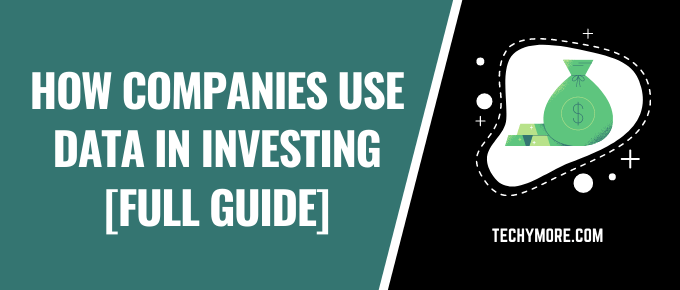Every single moment, users generate large datasets all around the world. Given today’s focus on the virtual business environment, it is obvious that companies seek efficient methods of embedding these data in their decision-making processes.
How Companies Use Data in Investing [Full Guide]

As more and more investment firms start to see the value of data, the business landscape also becomes increasingly competitive, which is why companies use data in investing. Let’s see how firms can use big data to improve their investment decisions.
Improved Operational Efficiency
Undoubtedly, one of the main uses of data in investing is to improve operational efficiency and financial performance. Big data is now used to identify investment opportunities that may not be recognized through traditional investment analyses. Although these forecasts may not be 100% risk-free, AI (artificial intelligence) investments and machine-learning methods are expected to increase accuracy. Artificial intelligence refers to machines collecting and analyzing data through algorithms that are able to learn and improve the quality and the accuracy of their results over time.
Analyzing the Market
Another crucial aspect of using data in investing is market analysis. Given the dynamics of 2021, staying up to date with emerging trends is compulsory for an efficient marketing campaign. Customer preferences are continuously shifting along with purchasing behaviors. Hence, businesses use big data to create more efficient marketing campaigns or even develop new products that could appeal to their target market.
As a result, using data to invest in new products or simply improve the business’s current workflow can be done by collecting market-related data. In addition to this, data investments allow firms to improve customer support and stay up to date with customer expectations.
Stand Out From the Competition
Big data may also be used to gather a deeper insight into competitors, along with other traditional data sources. Firms can now analyze how their competitors manage their social media engagements, how they attract their audience, and even identify the frequency of online marketing campaigns. This information helps the management fine-tune their business strategy and retain or improve their competitive edge.
Anticipating and Mitigating Risks
Risks are inherent in the business world, but forecasting and mitigation strategies have developed significantly. Businesses that invest in data may be able to identify risks before they hinder business performance. For example, a study mentions that big data helps companies to forecast the fashion future by analyzing social media content. Companies in the same industry can leverage this information and ensure the success of their future collections.
Customer Retention and R&D Improvements
Firms can collect data regarding their customers’ shopping experience to identify when a product reaches its maturity stage or contact customers who were unsatisfied to get them to return. This does not only help with customer retention rate but may also improve the R&D department’s efficiency and improve customer satisfaction by personalizing their experience.
Optimizing the Workflow
Businesses can use big data to optimize their workflow by investing in methods that can identify delays or gaps in current processes or even eliminate unnecessary, time-consuming ones. Access to a wide pool of data improves business functions by speeding up decision-making processes.
Big data solutions help companies handle their financial tasks, ensure regulatory compliance, and better assess the workforce’s performance. In terms of investment, this informational advantage can be leveraged in order to create a stronger portfolio and gain a competitive edge.
Making New Investments
Businesses and private investors alike commonly use traditional data sources, such as public financial statements, to make their decisions. However, access to big data now offers access to a plethora of new variables that can improve the returns while minimizing the risks.
Also Check: Factors to Consider While Choosing an ISP
For instance, businesses can use social media presence, customer behavior data, and other types of information when investing in a new project. M&A (mergers and acquisitions) is a field that could highly benefit from these data as the acquiring company obtains a better insight into the acquired company’s performance.
In addition to this, businesses can now evaluate all investment opportunities with increased accuracy. This is due to access to emotional, locational, and even demographic information that allows for a better estimation of asset value. This can also indicate whether an asset is undervalued and overvalued with improved efficiency.
Summary
All in all, today’s business environment is extremely competitive, and many companies must turn to big data and artificial intelligence to sort through impressive amounts of data. This leads to acquiring an informational advantage that helps businesses to strengthen their strategies, create more efficient marketing strategies, analyze competitors, and even improve and personalize the customer experience. Businesses that fail to adapt to these changing and challenging times could easily fall behind their competitors that successfully leverage social media information, emotional data, and other types of information to fine-tune their business strategy. Improving the workflow and efficiency of internal processes may also save time and lower expenses, so funds can be redirected to more rewarding projects.



![Influence of Technological Progress on Education [Complete Guide]](https://techymore.com/wp-content/uploads/2021/04/Influence-of-Technological-Progress-on-Education-complete-guide-1.png)
![Factors to Consider While Choosing an ISP [Full Guide]](https://techymore.com/wp-content/uploads/2021/04/Factors-to-Consider-While-Choosing-an-ISP-Full-Guide-1.png)

![How to Move a Window That is off Screen [Full Guide] How to Move a Window That is off Screen](https://techymore.com/wp-content/uploads/2020/01/How-To-Move-a-Window-That-is-off-Screen-with-Window-Arrangement-Settings-1.png)

![How to change your location on an iPhone – iPad [Step By Step]](https://techymore.com/wp-content/uploads/2022/03/How-To-Change-Your-Location-On-An-IPhone-IPad-1.png)

![How to Add a Voiceover to Your Videos [Full Guide] How To Add A Voiceover To Your Videos](https://techymore.com/wp-content/uploads/2021/09/How-To-Add-A-Voiceover-To-Your-Videos-Full-Guide-1.png)

![How to Block Programs With Your Firewall [Full Guide] How to Block Programs With Your Firewall](https://techymore.com/wp-content/uploads/2020/07/How-to-Block-Programs-With-Your-Firewall-Full-Guide-1.png)

